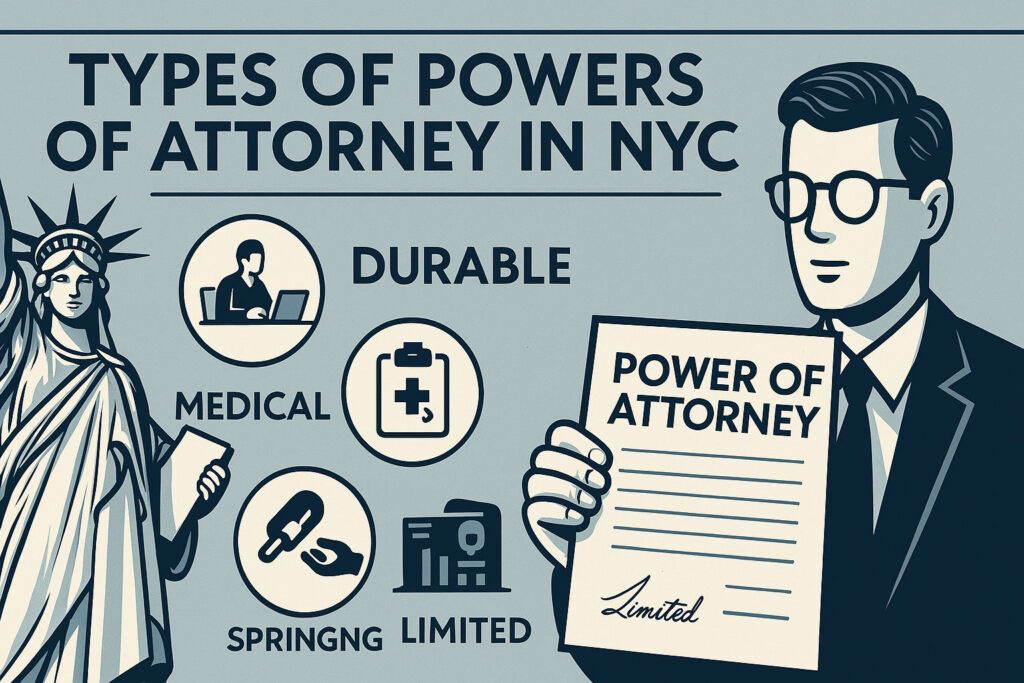NYC Power of Attorney: A Comprehensive Guide to Securing Your Future
Planning for unforeseen circumstances is essential in the vibrant city of New York. A Power of Attorney (POA) is a legal document that empowers you to designate a trusted individual to make financial and/or medical decisions on your behalf if you are unable to do so. Whether you are a young professional, a business owner, or a senior citizen, recognizing the significance of a POA and having the appropriate documentation in place can offer invaluable peace of mind. While navigating this process may seem daunting, it should not be a burden. At Morgan Legal Group, we aim to provide clarity and assurance during these critical moments.
Understanding Power of Attorney
Simply put, a Power of Attorney (POA) is a legal instrument that authorizes another individual to act on your behalf. This authority carries significant responsibilities and should not be underestimated. It is crucial to comprehend what a POA entails and what it does not cover:
- Grant legal guardianship
- Override decisions regarding family care
- Override established directives
It is imperative to be well-prepared before proceeding with a POA. Reach out to us today at Morgan Legal Group- Power of Attorney for expert guidance and support.
Varieties of Powers of Attorney in NYC
New York legislation recognizes several types of powers of attorney, each serving distinct purposes and scopes of authority. Selecting the appropriate type is crucial to meet your specific needs. Consider the following methods to ensure you make an informed decision:
- Durable Power of Attorney: Remains effective even if you become incapacitated, commonly used for estate planning.
- Non-Durable Power of Attorney: Terminates upon your incapacitation, typically for specific transactions or a limited duration.
- General Power of Attorney: Grants broad authority in financial matters.
- Limited Power of Attorney: Authorizes specific actions, such as real estate transactions or managing specific accounts.
- Healthcare Power of Attorney: Empowers an agent to make medical decisions on your behalf.
Choose wisely, as the type of POA you select can have significant implications.
Empowering Your Agent
When establishing a POA, you have the flexibility to define the specific powers you wish to delegate to your agent. These powers can range from comprehensive to restricted, depending on your preferences and requirements. Common powers granted in POAs include:
Financial Powers:
Includes managing bank accounts, paying bills, making investments, and handling tax matters.
Real Estate Powers:
Encompasses buying, selling, or managing real estate on your behalf.
Healthcare Powers:
Empowers an agent to make medical decisions, access medical records, and consent to or refuse treatment.
Legal Powers:
Authorizes representation in legal affairs and the hiring of attorneys.
It is essential to recognize the responsibility that accompanies these powers.
Requirements for Establishing a Valid NYC Power of Attorney
To ensure the legal validity of a POA in New York, adherence to specific requirements outlined in the General Obligations Law is essential. Following these steps can simplify the process:
- Understand the relevant laws and regulations
- Consult with a legal professional
- Thoroughly review and sign the necessary documentation
Adhering to these guidelines is crucial to ensure a legally sound and ethical POA. Refer to additional resources for further information.
Key Requirements for Creating a Power of Attorney in NYC
- Witnesses: Two individuals over 18 years old, not named as agents, must witness the POA.
- Acknowledgment: Your signature must be notarized by a public official.
- Statutory Form: Use the New York Statutory Short Form Power of Attorney or a similar language.
Preventing Power of Attorney Abuse in NYC
While a Power of Attorney (POA) is beneficial, there is a risk of abuse by dishonest agents. To safeguard against this, consider the following:
- Choose Your Agent Wisely: Select a trustworthy individual with integrity.
- Limit Authority: Grant specific powers to your agent as needed.
- Require Accountings: Include a provision for regular financial reports.
- Monitor Finances: Regularly review financial records for any misuse.
- Consult an Attorney: Seek legal advice to protect against abuse and address any suspicions.
FAQs About Powers of Attorney in NYC
- Q: Power of Attorney vs. Healthcare Proxy: POA for financial decisions, Healthcare Proxy for medical decisions.
- Q: Multiple Agents: Co-agents or successor agents can be named, but consider effectiveness.
- Q: Misuse of Authority: Revocation and legal action can be taken against abusive agents.
- Q: Expiration: POA can be durable or non-durable based on incapacitation.
- Q: Obtaining a Form: Find the form on the NY State Bar Association’s website or through an attorney.
Choosing the Right Estate Planning Attorney
When selecting an attorney for your POA needs, consider the following:
- Review the lawyer’s credentials.
- Seek legal referrals.
- Schedule a consultation with a law office.
Connect with Morgan Legal Group for Your Power of Attorney Needs
Planning for the future with a POA requires the expertise of an estate planning attorney. Morgan Legal Group offers personalized solutions in NYC and beyond, including areas like New York, Long Island, Brooklyn, Bronx, and Ulster County. Contact us today for assistance and explore our services for elder abuse prevention.
For more legal resources, visit NY Courts. Book an appointment for personalized services to secure your future.
The post NYC Power of Attorney appeared first on lawyer.bet.




